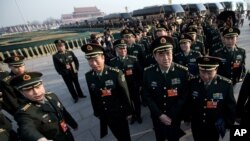A U.S. congressional panel reported that China's rapidly modernizing military is "altering the security balance in the Asia Pacific and challenging decades of U.S. military preeminence in the region."
That warning was given Wednesday in a wide-ranging annual report by the U.S.-China Economic and Security Review Commission, a body which advises U.S. lawmakers on Beijing-related policy.
The report also accused the Chinese government of "directing and executing a large-scale cyber espionage campaign against the United States." It said sanctions may be necessary to help deter the spying.
China has not responded to the allegations. Last year, Beijing's foreign ministry condemned the panel's report for having what it called a "Cold War" attitude.
Though it is still far outpaced by the U.S. in defense spending, China has steadily increased its military expenditures in recent decades. Beijing, for its part, insists its rise is peaceful.
However, commission chairman William Reinsch said China is more aggressively projecting its power abroad. He noted that Beijing is using "coercive" tactics in the East and South China Seas, where it has overlapping claims with many of its neighbors.
"It is becoming clear that China does not intend to resolve its maritime disputes through multilateral negotiations or the application of international laws and adjudicative processes, but prefers to use its growing power in support of coercive tactics to pressure its neighbors to concede China's claims," said Reinsch.
This comes as President Barack Obama pledges to put a greater economic and military emphasis on the region. The commission welcomed the so-called "pivot," but noted many U.S. allies are concerned budget constraints could limit Washington's ability to follow through.
To address these concerns and to "offset China's growing military capabilities," the report recommended Congress continue to fund efforts to move 60 percent of U.S. ships to the Pacific by 2020. Currently, 50 percent are stationed there.
Commissioner Larry Wortzel told lawmakers urgent action is needed.
"By 2020, China's navy and air force will outnumber and almost match the technical capabilities of our own forces in the Asia Pacific. A shrunken military may be insufficient to deter China or to reassure our friends and allies in the region," said Wortzel.
The panel also spoke of an "urgent need" for Washington to convince Beijing to change its approach to cyber spying, which analysts claim has cost U.S. companies billions of dollars.
Wortzel said China's military views cyberspace as a "critical element of its strategic competition with the United States."
"The Chinese government is directing and executing a large scale cyber espionage campaign that poses a major threat to U.S. industry, critical infrastructure, military operations, personnel, equipment, and readiness," continued Wortzel.
To help "change the cost-benefit calculus" for China, the report said, sanctions may be necessary. It listed import bans, travel bans, and other economic restrictions as possible actions to be taken against those caught stealing U.S. secrets.
That warning was given Wednesday in a wide-ranging annual report by the U.S.-China Economic and Security Review Commission, a body which advises U.S. lawmakers on Beijing-related policy.
The report also accused the Chinese government of "directing and executing a large-scale cyber espionage campaign against the United States." It said sanctions may be necessary to help deter the spying.
China has not responded to the allegations. Last year, Beijing's foreign ministry condemned the panel's report for having what it called a "Cold War" attitude.
Though it is still far outpaced by the U.S. in defense spending, China has steadily increased its military expenditures in recent decades. Beijing, for its part, insists its rise is peaceful.
However, commission chairman William Reinsch said China is more aggressively projecting its power abroad. He noted that Beijing is using "coercive" tactics in the East and South China Seas, where it has overlapping claims with many of its neighbors.
"It is becoming clear that China does not intend to resolve its maritime disputes through multilateral negotiations or the application of international laws and adjudicative processes, but prefers to use its growing power in support of coercive tactics to pressure its neighbors to concede China's claims," said Reinsch.
This comes as President Barack Obama pledges to put a greater economic and military emphasis on the region. The commission welcomed the so-called "pivot," but noted many U.S. allies are concerned budget constraints could limit Washington's ability to follow through.
To address these concerns and to "offset China's growing military capabilities," the report recommended Congress continue to fund efforts to move 60 percent of U.S. ships to the Pacific by 2020. Currently, 50 percent are stationed there.
Commissioner Larry Wortzel told lawmakers urgent action is needed.
"By 2020, China's navy and air force will outnumber and almost match the technical capabilities of our own forces in the Asia Pacific. A shrunken military may be insufficient to deter China or to reassure our friends and allies in the region," said Wortzel.
The panel also spoke of an "urgent need" for Washington to convince Beijing to change its approach to cyber spying, which analysts claim has cost U.S. companies billions of dollars.
Wortzel said China's military views cyberspace as a "critical element of its strategic competition with the United States."
"The Chinese government is directing and executing a large scale cyber espionage campaign that poses a major threat to U.S. industry, critical infrastructure, military operations, personnel, equipment, and readiness," continued Wortzel.
To help "change the cost-benefit calculus" for China, the report said, sanctions may be necessary. It listed import bans, travel bans, and other economic restrictions as possible actions to be taken against those caught stealing U.S. secrets.











